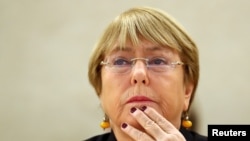U.N. human rights chief Michelle Bachelet has issued a stark warning that climate change poses a rapidly growing global threat to human rights as dwindling resources due to global warming lead to increased hunger, migration and conflict. Bachelet spoke at the opening of the 42nd session of the U.N. Human Rights Council.
In a prelude to the High Commissioner’s speech, a U.N. Representative of the Bahamas warned natural disasters of historic proportions such as Hurricane Dorian are becoming the new norm. In agreeing with this assessment, Michelle Bachelet said climate change is a reality affecting every region of the world.
She said the climate emergency is driving a sharp increase in global hunger. Citing the World Health Organization, she said climate change is expected to cause an estimated 250,000 additional deaths every year between 2030 and 2050 from malnutrition, malaria, and other ailments.
“The world has never seen a threat to human rights of this scope. This is not a situation where any country, any institution, any policymaker can stand on the sidelines. The economies of all nations; the institutional, political, social and cultural fabric of every State, and the rights of all your people – and future generations – will be impacted,” said the U.N. rights chief.
Bachelet warns of escalating conflicts due to climate change, noting that 40 percent of civil wars over the past six decades have been linked to environmental degradation. She expresses particular concern about the countries of the Sahel, which is among the regions most vulnerable to climate change.
“The degradation of arable land across the Sahel region is intensifying competition for already scarce resources, leading to frequent clashes between herders and agriculturalists – which, in turn, exacerbate ethnic tensions. Slow development and increasing poverty are exposing youth to exploitation by extremist and terrorist groups, fueling violence," she said.
Bachelet presents a generally pessimistic view of the current state of human rights throughout the world. She notes fundamental freedoms and protections of the weakest and most vulnerable are being eroded in all regions. She said not even strong democracies such as the United States are immune from this.
The U.N. rights chief said she is deeply disturbed that the United States, a nation built on welcoming migrants, is implementing policies that sharply reduce protections for migrant families. She expresses particular concern about Washington’s officially rescinded policy of separating migrant children from their parents, which she says still goes on.




